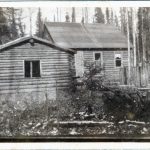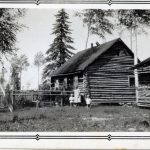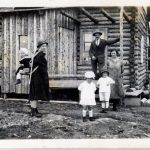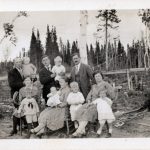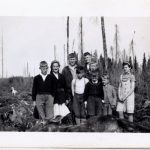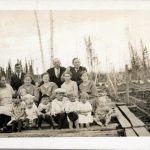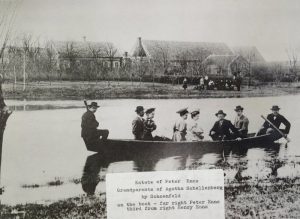
The fine houses on the shore were made partly out of wood, that came from trees, naturally. The estate belongs to Peter Enns at the far right end of on the boat. He planted an entire orchard that you can see if you look closely. Mennonites were good at planting things, like trees.
The man sitting at the left end of the boat, oar in hand, feels secure in the knowledge that he’s not going to lose his balance simply because his brain suddenly doesn’t work. The ladies don’t expect to spoil their hats and dresses in the Dnieper River either, since boats are made from wood, that comes from trees which float. The boat isn’t just suddenly begin to sink; their escorts don’t believe this either. Neither do the onlookers on shore, all dressed up in their best clothes, expect to witness a passing boat fill with water, and sink in front of their eyes. Things like that just don’t happen.
They came from the villages of Chortiza and Molotschna, Ukraine (Russia at the time), following and during the Russian Revolution. The starving Russian Bolsheviks had done the unthinkable: they had killed the Czar and his entire family because the Czar was a wealthy person, a kulak. All kulaks were to die. The terrorists, led by Nestor Makhno, whose home was in Schönfeld, Molotschna, hacked some of the Mennonites to pieces with their sabres, others they shot, and some they bludgeoned to death. They took the horses and houses of the survivors and starved them. The Mennonites fled the Ukraine, some of them stealthily in the middle of the night, leaving their homeland by the tens of thousands. When they arrived at the border, in Riga, they fell on their knees on the floor of the train and to give thanks to God for their deliverance.
In 1927 or thereabouts, a few of the Mennonites who had come to Canada from the Ukraine settled in a place called Reesor, a wilderness place , a place of trees in northern Ontario. The trees had harmed no one. They sheltered man and beast, of which there were a few, like wolves, bears, and moose. The spruce trees were healthy and grew straight up. The settlers were also strong and vigorous. They had chosen to live up in the north among the trees, away from everyone, safe for sure. There was no problem in finding the right trees to make continuous walls and roofs for their new dwelling places.
At night the insects hiding underneath the bark, made rustling sounds as they emerged.
